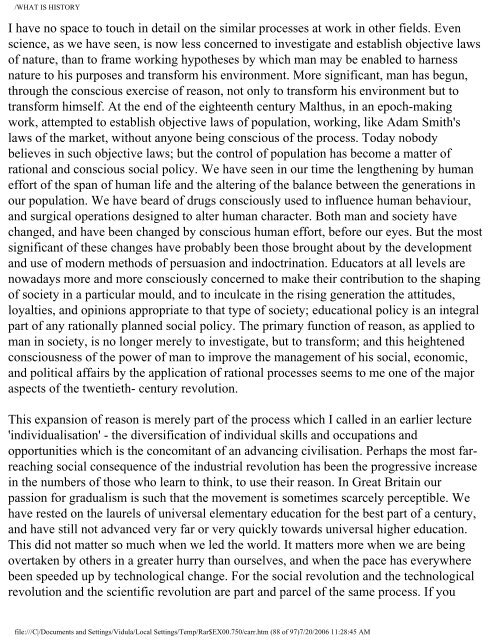What is History / by Edward Hallett Carr - Universal History Library
What is History / by Edward Hallett Carr - Universal History Library
What is History / by Edward Hallett Carr - Universal History Library
You also want an ePaper? Increase the reach of your titles
YUMPU automatically turns print PDFs into web optimized ePapers that Google loves.
WHAT IS HISTORY<br />
I have no space to touch in detail on the similar processes at work in other fields. Even<br />
science, as we have seen, <strong>is</strong> now less concerned to investigate and establ<strong>is</strong>h objective laws<br />
of nature, than to frame working hypotheses <strong>by</strong> which man may be enabled to harness<br />
nature to h<strong>is</strong> purposes and transform h<strong>is</strong> environment. More significant, man has begun,<br />
through the conscious exerc<strong>is</strong>e of reason, not only to transform h<strong>is</strong> environment but to<br />
transform himself. At the end of the eighteenth century Malthus, in an epoch-making<br />
work, attempted to establ<strong>is</strong>h objective laws of population, working, like Adam Smith's<br />
laws of the market, without anyone being conscious of the process. Today nobody<br />
believes in such objective laws; but the control of population has become a matter of<br />
rational and conscious social policy. We have seen in our time the lengthening <strong>by</strong> human<br />
effort of the span of human life and the altering of the balance between the generations in<br />
our population. We have beard of drugs consciously used to influence human behaviour,<br />
and surgical operations designed to alter human character. Both man and society have<br />
changed, and have been changed <strong>by</strong> conscious human effort, before our eyes. But the most<br />
significant of these changes have probably been those brought about <strong>by</strong> the development<br />
and use of modern methods of persuasion and indoctrination. Educators at all levels are<br />
nowadays more and more consciously concerned to make their contribution to the shaping<br />
of society in a particular mould, and to inculcate in the r<strong>is</strong>ing generation the attitudes,<br />
loyalties, and opinions appropriate to that type of society; educational policy <strong>is</strong> an integral<br />
part of any rationally planned social policy. The primary function of reason, as applied to<br />
man in society, <strong>is</strong> no longer merely to investigate, but to transform; and th<strong>is</strong> heightened<br />
consciousness of the power of man to improve the management of h<strong>is</strong> social, economic,<br />
and political affairs <strong>by</strong> the application of rational processes seems to me one of the major<br />
aspects of the twentieth- century revolution.<br />
Th<strong>is</strong> expansion of reason <strong>is</strong> merely part of the process which I called in an earlier lecture<br />
'individual<strong>is</strong>ation' - the diversification of individual skills and occupations and<br />
opportunities which <strong>is</strong> the concomitant of an advancing civil<strong>is</strong>ation. Perhaps the most farreaching<br />
social consequence of the industrial revolution has been the progressive increase<br />
in the numbers of those who learn to think, to use their reason. In Great Britain our<br />
passion for gradual<strong>is</strong>m <strong>is</strong> such that the movement <strong>is</strong> sometimes scarcely perceptible. We<br />
have rested on the laurels of universal elementary education for the best part of a century,<br />
and have still not advanced very far or very quickly towards universal higher education.<br />
Th<strong>is</strong> did not matter so much when we led the world. It matters more when we are being<br />
overtaken <strong>by</strong> others in a greater hurry than ourselves, and when the pace has everywhere<br />
been speeded up <strong>by</strong> technological change. For the social revolution and the technological<br />
revolution and the scientific revolution are part and parcel of the same process. If you<br />
file:///C|/Documents and Settings/Vidula/Local Settings/Temp/Rar$EX00.750/carr.htm (88 of 97)7/20/2006 11:28:45 AM







